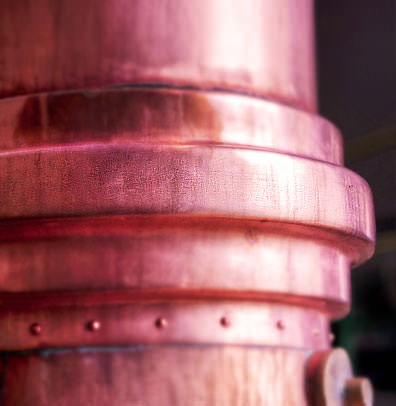What is hobby distilling?
Hobby distilling is a recreational activity for people who
legally make beer, wine, or other fermented beverages, and then
use that beer or wine to make a distilled spirit. Isn’t hobby distilling already permitted?
No. Although hobbyists are allowed to make beer and wine,
current laws prohibit hobbyists from using their beer and wine
to make a distilled spirit. What is distilling?
Distilling is a process that increases the concentration of
alcohol. Basically, you warm beer or wine until it makes a
vapor, then you cool the vapor so it becomes a liquid again. The
cooled liquid (the spirit) will then have a higher concentration
of alcohol. If that’s all you’re doing, then why is it prohibited?
Hobby distilling is currently prohibited because many of the
existing laws that were written during the prohibition era (1920
to 1933) were never updated. During that time, there was a
national ban on the sale, production and transportation of
alcohol as mandated by the Eighteenth Amendment to The
Constitution of the United States. The Eighteenth Amendment was
repealed in December of 1933, but many of the laws and
regulations were never changed. Then why are you allowed to make beer and wine, but not spirits?
No one knows for sure. But many people believe that beer and
wine were simply more popular when some of the laws were
updated. Winemaking was permitted when prohibition was repealed
in 1933. Then in 1978, President Jimmy Carter signed a bill into
law that permitted hobbyists to make beer without paying taxes
or posting bonds that took effect in 1979. That’s what prompted
most states to update their own beer and wine laws. In some
states making beer and wine as a hobby only recently became
legal . For example, until July 1, 2013 it was still illegal to
make beer or wine in Mississippi. You mentioned taxes. Won’t the government lose money if hobby distilling
is permitted?
Not at all. The beer and wine used by hobbyists are already
exempt from taxes. There isn’t anything new for the government
to tax. Do any other countries allow hobby distilling?
Yes. New Zealand changed its laws to permit hobby distilling in
1996. Don’t home made spirits make you go blind?
This is a very common misconception that is due to a practice
commonly employed by prohibition era moonshiners and
bootleggers: that of adding methanol (methyl alcohol) to
previously distilled spirits. This nefarious practice was used
to increase profits by increasing the volume of illicit spirits
with the much less expensive and widely available methanol. The
intentional use of such contaminants within the hobby distilling
community, which is motivated by quality rather than profit,
simply does not occur. But isn’t there still some methanol in spirits?
Yes. Methanol occurs naturally in foods, beverages, and even in
the human body. It is found in most fruit and vegetable juices
as well as in beer, wine and even soft drinks. However, in small
naturally occurring amounts, methanol poses no significant
health risks. Most people don’t realize that a liter of orange
juice can contain more methanol than ten liters of bourbon! In New Zealand, where hobby distilling has been legal for almost
18 years there hasn’t been a single reported case of methanol
poisoning due to hobby distilling. What about explosions and fires?
We’re not sure where this misconception originated, but it may
be related to accidents caused by pressure cookers and turkey
fryers. Pressure cookers are sealed units (not open to the
atmosphere) which is why they must employ one or more pressure
relief valves. However, a distillation unit (still) is designed
to be open to the atmosphere at all times. The risk of an
explosion does not exist under such conditions.Based on
statistics gathered by the U.S. Fire Administration’s National
Fire Data Center, the primary causes of residential building
fires are cooking, heating system malfunction, electrical
malfunction, and carelessness, which account for over 60% of all
residential fires. Cooking, by a large margin, is the leading
cause and accounts for over 45% of all residential fires of
known cause. Basically, human behavior is responsible for an
overwhelming majority of cooking fires, not the contents of the
pot or pan.Hobby distilling falls squarely into the cooking
category as it amounts to little more than warming a liquid and
cooling its vapor. It most closely resembles the process of
steaming vegetables or seafood. Distilling within the home is no
less safe than boiling a pot full of potatoes. What about the show “Moonshiners?” Aren’t you doing the same thing?
Heavens no! The people you see on the show “Moonshiners” are
criminals that are motivated by greed and profit. They make
hundreds of gallons of illicit alcohol, and then sell that
alcohol for the sole purpose of making money. Then what makes a hobbyist any different than the people we see on
“Moonshiners?”
Hobbyists are simply engaging in a safe, fun and interesting
recreational activity. They do not sell the spirits they
produce, so they are not motivated by profits. A typical
hobbyist may produce only a few gallons of spirits each year for
personal and family use, so they seek quality and perfection,
much like the people who bake or cook for a hobby. So what’s the problem? Don’t the laws treat hobbyists and moonshiners
differently?
Unfortunately, no. Based on existing laws, there is no
difference between a hobby distiller and a criminal moonshiner.
The very same penalties that apply to a criminal who makes and
sells hundreds of gallons of illicit alcohol also apply to the
hobbyist who occasionally makes a liter of brandy to enjoy only
with his family. That doesn’t sound fair. What laws need to be changed?
Only a few small changes to the Internal Revenue Code are
necessary – basically the same changes that currently permit a
hobbyist to make beer and wine. How can I help legalize hobby distilling?
Visit the Hobby Distiller’s Association website
(www.hobbydistillersassociation.org) and offer your support.

